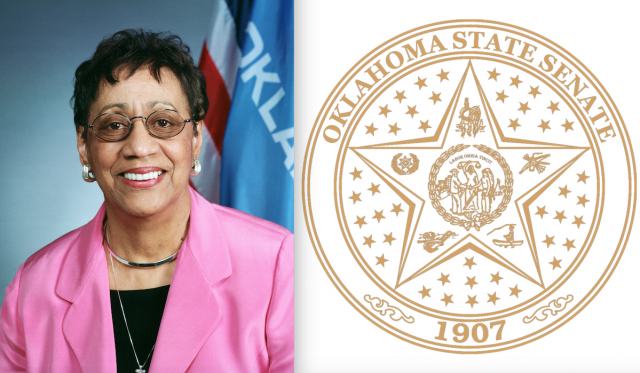
Former Sen. Maxine Horner, who was one of the first two Black women to serve in the Oklahoma State Senate, died Sunday at age 88. Horner represented State Senate District 11 in Tulsa from 1987 until 2005, championing education causes and issues of equity.
Even after she left the Legislature, Horner advocated for greater awareness and recognition of the Tulsa Race Massacre, recently chairing a committee that oversaw the search for unmarked graves of its victims.
This afternoon, Rep. Regina Goodwin (D-Tulsa) spoke about Horner on the House floor and asked that her colleagues pray for the Horner family.
“If we could be half of the diplomat, half of the statesman she was, we would be a lot better off in this body,” Goodwin said. “If you’ve heard of Oklahoma’s Promise, it was because of Sen. Maxine Horner. If you’ve heard of the Greenwood Cultural Center, it was because of Sen. Maxine Horner and at that time Rep. Don Ross.”
Roxanne Blystone, who is now the executive assistant to Sen. Lonnie Paxton (R-Tuttle), previously worked as an assistant for both Ross and Horner.
“She was just a gracious, elegant lady. Always kept her poise,” Blystone said Monday when she learned of Horner’s passing. “I can just always remember her keeping her cool. She was gracious to everybody.”
Donna Garlick, another longtime executive assistant in the State Senate, echoed those remarks.
“She was just a wonderful lady. I remember Sen. Maxine Horner very fondly,” Garlick said. “She was a gracious lady and did so much for her district.”
Horner ‘would bring out the best in people’
Former Sen. Jabar Shumate (D-Tulsa) also praised Horner in a statement to NonDoc.
“Oklahoma lost an extraordinary public servant in the passing of Sen. Maxine Horner. She was a skilled legislator who would bring out the best in people in order to accomplish meaningful change,” Shumate said. “Always mindful of the need to equip people with the ability to discover their purpose, her groundbreaking legislation gave those without access an education and those without training the support they needed to get a job. I am because she was — committed to opening doors for countless ordinary people who couldn’t help themselves.”
Shumate was referring to Horner’s legislation creating the Oklahoma Higher Learning Access Program (OHLAP), also known as Oklahoma’s Promise. The collegiate scholarship program is open to Oklahoma students of low and middle-income families who maintain a certain GPA.
“She was a strong advocate for so many things,” recalled former Senate President Pro Tempore Stratton Taylor (D-Claremore). “She was the driving force behind the Oklahoma Jazz Hall of Fame in Tulsa along with efforts to revitalize the Greenwood area. She was also just a very strong advocate for a lot of different progressive positions, women’s rights issues, and she also just carried herself with such grace.”
Horner served as Democratic Caucus chairperson from 1995 to 2003 while Taylor led the Senate.
“I always remember when she would chair a Democratic Caucus, and there were a bunch of us in there and we were usually eating sandwiches or something,” Taylor said. “She always had the best manners of us. The rest of us needed to go to some kind of manners school, and Sen. Horner was always so regal even in that part of her life. She was a strong voice for all of Tulsa and especially north Tulsa.”
Horner was the first woman and the first Black person to serve as Senate Democratic Caucus chairperson, which Taylor emphasized as significant.
“I relied on her a lot to help manage difficult issues through the caucus,” he said. “The caucus chair is, for lack of a better word, the pro tem’s leadership position to help manage the caucus and help produce consensus out of the caucus and to keep order in the caucus and to help round up votes when the caucus was split.”
Taylor recalled that one of Horner’s grandchildren, Corey Tisdale, spent significant time with her at the State Capitol. When she was inducted into the Oklahoma Women’s Hall of Fame, Taylor said he remembered how Tisdale referenced her position as caucus chairwoman.
“There she was managing a caucus which, at the time, that was comprised of a significant number of rural white men,” Taylor said.
Former Sen. Kenneth Corn (D-Howe) also served alongside Horner, who termed out of the Legislature after the 2004 session.
“Sen. Horner served the people of north Tulsa and the state with dignity and grace. While a gentle lady, she was a strong force to be reckoned with when it came to fighting for the people she represented,” Corn said. “It was her efforts that gave Oklahoma the Jazz Hall of Fame. She helped to push Oklahoma forward in advancing civil rights and recognizing the painful and ugly history of the Tulsa Race Massacre. Her contributions to Oklahoma are tremendous.”
Former Sen. Jim Dunlap (R-Bartlesville) served with Horner and is now a lobbyist at the State Capitol.
“Sen. Maxine Horner was a wonderful person and a great servant to Oklahoma,” Dunlap said. “She moved the needle as to race relations, and I will remember her as a very sharp and gentle person. I am proud to have served with her in the Oklahoma State Senate.”
Anita Arnold, the director of BLAC, Inc., noted Horner’s friendship over the years.
“I am so sorry to learn of Sen. Horner’s passing. I worked with Sen. Horner while I served on the 1988 National Democratic Site Selection Committee for the 1988 convention in Atlanta and on many state and local projects,” Arnold said. “She was am outstanding state legislator. Most importantly, she was my friend.”
Services are pending for Horner, according to the Tulsa World.
(Update: This article was updated at 4 p.m. Monday, Feb. 8, to include comment from Dunlap. It was updated again at 5:10 p.m. to include a quote from Arnold.)





















